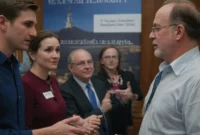Scholarship holds immense importance as it:
- Expands human knowledge and deepens our understanding of the world.
- Challenges existing ideas stimulate critical thinking, and foster innovation.
- Provides a foundation for informed decision-making and problem-solving.
- Preserves cultural heritage and contributes to societal progress.
With roots in ancient traditions of learning, scholarship has evolved over centuries. Universities and research institutions play a pivotal role in nurturing and disseminating scholarship. Today, advancements in technology and globalization have expanded the reach and impact of scholarly work.
What is a Scholarship?
Scholarship encompasses a diverse range of activities and outcomes that contribute to the advancement of knowledge. Its key aspects include:
Research: Systematic investigation and analysis to generate new knowledge.
Critical Inquiry: Questioning and examining existing ideas and assumptions.
Dissemination: Sharing knowledge through publications, conferences, and other platforms.
Preservation: Archiving and protecting knowledge for future generations.
Collaboration: Working together to achieve shared scholarly goals.
Innovation: Developing new ideas, methods, and technologies.
Teaching: Imparting knowledge and skills to students.
Service: Applying knowledge to address societal challenges.
These aspects are interconnected and mutually reinforcing. Research forms the foundation of scholarship, while critical inquiry challenges and refines existing knowledge. Dissemination and preservation ensure that knowledge is accessible and enduring.
Collaboration fosters innovation and the sharing of diverse perspectives. Teaching and service extend the impact of scholarship beyond academia, enriching society and addressing real-world problems.
Research
Research constitutes a cornerstone of scholarship, providing the foundation for new knowledge and understanding. Through rigorous and systematic investigation, researchers aim to uncover hidden truths, challenge established theories, and expand the boundaries of human knowledge.
Methodology: Research is characterized by the use of well-defined methods and methodologies. These methods ensure that data is collected and analyzed objectively, minimizing bias and increasing the reliability of findings.
Critical Thinking: Research involves critical thinking and analysis. Researchers question assumptions, evaluate evidence, and form reasoned conclusions based on their findings.
Innovation: Research often leads to innovative discoveries and advancements. By pushing the boundaries of knowledge, researchers pave the way for new technologies, treatments, and solutions to societal challenges.
Collaboration: Research is frequently a collaborative endeavor. Scientists and scholars from diverse fields work together to combine their expertise and resources, leading to interdisciplinary breakthroughs.
Ultimately, research is essential for the progress of scholarship. It generates new knowledge, challenges existing assumptions, and drives innovation. By systematically investigating and analyzing the world around us, researchers contribute to our collective understanding and help shape the future of humanity.
Critical Inquiry
Critical inquiry is fundamental to scholarship, driving the advancement of knowledge and understanding. It involves questioning, examining, and challenging existing ideas and assumptions, leading to deeper insights and more robust theories.
Skepticism and Doubt: Critical inquiry begins with a healthy skepticism and doubt toward existing knowledge. Scholars question the validity of assumptions, challenge conventional wisdom, and seek evidence to support or refute claims.
Analysis and Interpretation: Critical inquiry involves careful analysis and interpretation of data and information. Scholars examine evidence from multiple perspectives, considering different interpretations and drawing reasoned conclusions.
Argumentation and Debate: Critical inquiry often involves argumentation and debate. Scholars engage in respectful discourse, presenting evidence and reasoning to support their claims and challenge opposing viewpoints.
Reflection and Revision: Critical inquiry is an ongoing process that involves reflection and revision. Scholars revisit their assumptions and interpretations, considering new evidence and perspectives, and refining their understanding over time.
Through critical inquiry, scholars push the boundaries of knowledge, challenge conventional wisdom, and contribute to the development of more nuanced and accurate understandings of the world. Critical inquiry is essential for the progress of scholarship and the pursuit of truth.
Dissemination
Dissemination is an essential aspect of scholarship, as it allows scholars to share their research findings and ideas with the broader academic community and the public. Through publications, conferences, and other platforms, scholars disseminate their work and contribute to the advancement of knowledge.
Publications: Scholarly publications, such as journal articles, books, and monographs, are the primary means of disseminating research findings. They allow scholars to present their work in a structured and peer-reviewed format, ensuring the quality and rigor of the scholarship.
Conferences: Conferences provide a platform for scholars to present their research findings and engage in discussions with peers. They facilitate the exchange of ideas, foster collaboration, and stimulate new research directions.
Other platforms: In addition to traditional publications and conferences, scholars also disseminate their work through various other platforms, such as online repositories, social media, and public lectures. These platforms allow scholars to reach a wider audience and engage with non-academic stakeholders.
Dissemination plays a crucial role in the advancement of scholarship by facilitating the dissemination and exchange of knowledge. By sharing their research findings and engaging in scholarly discourse, scholars contribute to the collective body of knowledge and drive the progress of their fields.
Preservation
Preservation is an essential aspect of scholarship, as it ensures that the knowledge and insights gained through research and inquiry are not lost but are preserved for future generations. Archiving and protecting knowledge takes various forms, including the preservation of physical artifacts, the digitization of historical documents, and the establishment of libraries and archives.
Historical Preservation: Preserving historical artifacts, documents, and records is crucial for understanding the past and informing the present. Scholars rely on preserved historical materials to conduct research, gain insights into past societies, and trace the evolution of ideas.
Digitization and Archiving: In the digital age, digitization and archiving have become essential for preserving knowledge. Digital archives and repositories allow for the preservation and dissemination of vast amounts of information, making it accessible to scholars and the public alike.
Libraries and Archives: Libraries and archives serve as repositories of knowledge, housing collections of books, manuscripts, and other materials. They provide scholars with access to a wealth of information and resources, facilitating research and the preservation of knowledge.
Cultural Heritage: Preservation also includes the safeguarding of cultural heritage, such as traditional practices, languages, and art forms. Preserving cultural heritage ensures the continuity of cultural traditions and provides insights into the diversity of human experience.
Preservation is fundamental to scholarship, as it ensures the continuity of knowledge and the availability of resources for future generations. By preserving knowledge, scholars contribute to the collective body of human understanding and lay the foundation for future advancements.
Collaboration
In the realm of scholarship, collaboration serves as a cornerstone, fostering the advancement of knowledge and understanding. It involves scholars working together, pooling their expertise, resources, and perspectives to achieve shared scholarly goals.
Synergy and Innovation: Collaboration brings together diverse minds and skill sets, creating a synergistic environment that fosters innovation and breakthroughs. By combining their expertise, scholars can tackle complex problems and develop novel solutions that might not be possible through individual efforts.
Cross-Pollination of Ideas: Collaboration facilitates the cross-pollination of ideas, leading to a richer and more nuanced understanding of research topics. Scholars from different disciplines and backgrounds bring fresh perspectives, challenge assumptions, and inspire new lines of inquiry.
Resource Sharing and Efficiency: Collaboration allows scholars to share resources and optimize their efforts. By pooling their data, equipment, and expertise, they can avoid duplication and increase the efficiency of their research endeavors.
Mentorship and Training: Collaboration provides opportunities for mentorship and training, fostering the next generation of scholars. Senior researchers can guide and support junior colleagues, sharing their knowledge and expertise, and nurturing the development of future leaders in the field.
Collaboration is not merely a strategy but an essential aspect of scholarship. By working together, scholars amplify their impact, push the boundaries of knowledge, and contribute to the collective advancement of their disciplines and the broader society.
Innovation
Innovation is intricately connected to scholarship, serving as a driving force behind the advancement of knowledge and the creation of new ideas, methods, and technologies. Scholarship provides the foundation upon which innovation can flourish, while innovation, in turn, propels scholarship forward by introducing novel approaches and solutions to research challenges.
As scholars engage in research and critical inquiry, they constantly seek to develop innovative ideas and methods to address complex questions and push the boundaries of understanding. Innovation can manifest in various forms, from the development of new theories and models to the creation of cutting-edge technologies and methodologies.
For instance, in the field of medicine, innovative research has led to groundbreaking discoveries and advancements in disease diagnosis, treatment, and prevention. The development of new imaging technologies, such as MRI and CT scans, has revolutionized medical diagnostics, providing physicians with detailed Einblicke into the human body and enabling more accurate diagnoses.
Moreover, innovation plays a crucial role in addressing global challenges and societal issues. Interdisciplinary collaboration between scholars, scientists, and engineers has led to the development of innovative solutions to pressing problems, such as climate change, energy sustainability, and global health crises.
Understanding the connection between innovation and scholarship is essential for fostering a culture of creativity and progress in academia and beyond. By embracing innovation and encouraging scholars to think outside the box, we can unlock the potential for transformative discoveries and advancements that benefit society as a whole.
Teaching

Teaching, the act of imparting knowledge and skills to students, holds a vital connection to scholarship. It serves as a bridge between the creation and dissemination of knowledge, fostering a continuous cycle of learning and intellectual growth.
- Knowledge Transmission: Teaching enables scholars to transmit their expertise and specialized knowledge to the next generation of learners. Through lectures, discussions, and practical training, they share their research findings, theories, and methodologies, ensuring the continuation and advancement of various fields of study.
- Critical Thinking and Analysis: Effective teaching goes beyond the mere transfer of information. It encourages students to develop critical thinking skills, question assumptions, and analyze complex ideas. By fostering a culture of inquiry and debate, teachers empower students to become independent thinkers and lifelong learners.
- Practical Application: Teaching connects theoretical knowledge with practical applications. Through hands-on experiences, case studies, and projects, students learn how to apply their knowledge to real-world scenarios, preparing them for future careers and contributions to society.
- Inspiration and Mentoring: Teachers play a pivotal role in inspiring and mentoring students. They provide guidance, support, and encouragement, fostering students’ intellectual curiosity and passion for learning. By sharing their own experiences and insights, teachers can ignite a lifelong love of scholarship in their students.
In essence, teaching is an integral part of scholarship, as it ensures the dissemination, application, and preservation of knowledge. By imparting knowledge and skills to students, scholars contribute to the advancement of their disciplines and the education of future generations, perpetuating the pursuit of truth and understanding.
Service
Scholarship extends beyond the pursuit of knowledge for its own sake; it also entails the application of knowledge to address societal challenges and improve the human condition.
- Research for Social Impact: Scholarship involves conducting research that directly addresses pressing social issues, such as poverty, environmental degradation, and social inequality. By generating evidence-based insights, scholars can inform policymaking and advocate for evidence-based solutions.
- Community Engagement: Scholars engage with communities to understand their needs and co-create knowledge that is relevant and responsive to local contexts. Through community-based research and participatory action research, scholars empower communities to identify and address their challenges.
- Public Education and Outreach: Scholarship involves sharing knowledge with the public through various channels, such as lectures, workshops, and online platforms. By translating complex research findings into accessible formats, scholars contribute to public understanding of important issues and promote informed decision-making.
- Policy Engagement: Scholars engage with policymakers to inform policy decisions and advocate for evidence-based policies. They provide expert testimony, conduct policy analysis, and collaborate with policymakers to develop and implement effective solutions to societal problems.
In sum, service is an integral aspect of scholarship, as it connects the academy with the wider world and leverages knowledge to make a positive impact on society. By applying their knowledge to address societal challenges, scholars contribute to a more just, equitable, and sustainable world.
Frequently Asked Questions about Scholarship
This section addresses commonly asked questions and misconceptions surrounding the concept of scholarship, providing concise and informative answers.
Question 1: What is the definition of scholarship?
Scholarship encompasses the creation, dissemination, and application of knowledge through research and critical inquiry. It involves the systematic study, analysis, and experimentation conducted by scholars to advance understanding in various fields.
Question 2: What are the key characteristics of scholarship?
The scholarship is characterized by its rigor, originality, and contribution to the existing body of knowledge. It adheres to strict methodological standards, ensuring the reliability and validity of research findings.
Question 3: What is the role of innovation in scholarship?
Innovation is a driving force in scholarship, as it leads to the development of new ideas, methods, and technologies. Scholars constantly push the boundaries of knowledge by challenging established paradigms and exploring novel approaches.
Question 4: How does scholarship impact society?
Scholarship has a profound impact on society by generating new knowledge and informing decision-making. It contributes to technological advancements, improves our understanding of the world, and addresses societal challenges.
Question 5: What are the different types of scholarship?
Scholarship encompasses a diverse range of activities, including research, teaching, critical inquiry, and service. Each type contributes to the advancement of knowledge and the dissemination of ideas.
Question 6: What is the importance of preserving scholarship?
Preserving scholarship is crucial for ensuring the continuity of knowledge and the availability of resources for future generations. It allows scholars to build upon existing research and insights, fostering the cumulative growth of understanding.
In summary, scholarship is a dynamic and multifaceted endeavor that plays a vital role in expanding human knowledge, driving innovation, and addressing societal challenges.
Proceed to the next section to delve deeper into the significance and benefits of scholarship.
Tips for Nurturing Scholarship
To foster a thriving scholarly environment, consider these practical tips:
Tip 1: Encourage Critical Thinking and Inquiry
Cultivate an atmosphere that values questioning, analysis, and the exploration of multiple perspectives. Challenge students to think critically, question assumptions, and engage in evidence-based reasoning.
Tip 2: Support Research and Innovation
Provide resources and opportunities for scholars to conduct original research, experiment with new ideas, and push the boundaries of knowledge. Foster collaboration and interdisciplinary approaches to encourage innovation and groundbreaking discoveries.
Tip 3: Promote Open and Rigorous Scholarship
Emphasize the importance of transparency, reproducibility, and peer review in scholarly work. Encourage scholars to share their data, methods, and findings openly, fostering a culture of accountability and intellectual integrity.
Tip 4: Recognize and Reward Scholarship
Establish mechanisms to recognize and reward outstanding scholarly achievements. Celebrate the contributions of scholars through awards, promotions, and opportunities for professional development.
Tip 5: Foster Collaboration and Mentorship
Encourage collaboration among scholars from diverse backgrounds and disciplines. Facilitate mentorship programs that connect experienced scholars with emerging researchers, providing guidance and support for their professional growth.
Summary: By implementing these tips, institutions and organizations can create a fertile environment for scholarship to flourish. Nurturing critical thinking, supporting research, promoting open and rigorous practices, recognizing scholarly achievements, and fostering collaboration will ultimately contribute to the advancement of knowledge and the betterment of society.
Proceed to the next section to explore the profound benefits of scholarship.
Conclusion
Scholarship, encompassing the creation, dissemination, and application of knowledge, stands as a cornerstone of human progress. It expands the boundaries of our understanding, drives innovation, and addresses societal challenges, shaping a more just and equitable world.
By fostering critical thinking, supporting research, promoting open and rigorous practices, recognizing scholarly achievements, and nurturing collaboration, we cultivate a fertile environment for scholarship to flourish. As we continue to explore the vast tapestry of knowledge, scholarship will remain an indispensable force in shaping our future and ensuring the betterment of humanity.





